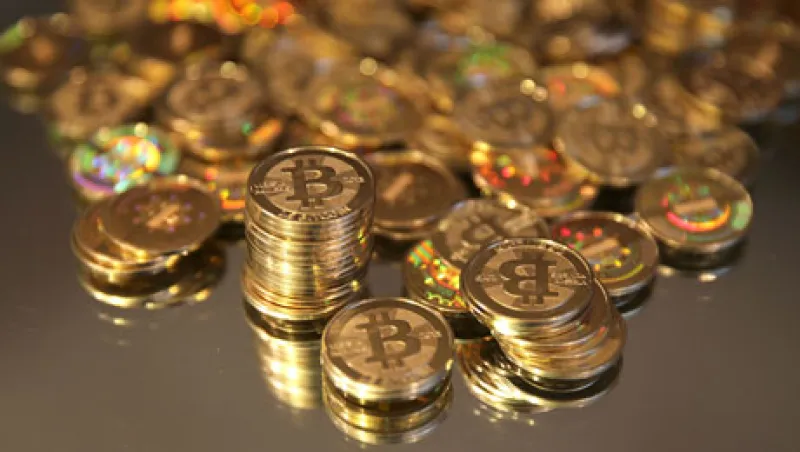Riddle: What is impossible to hold, easy to gift and costs more than $1,000? If you guessed “a pair of couture gloves made by a deranged Nordic designer from the skin of an Icelandic basking shark, lined with thornlike teeth,” you would be wrong (gifting such items might involve violating multiple exotic animal customs regulations). If you guessed a Bitcoin, you would, as of this week, be right.
The price of a single Bitcoin is fast approaching the cost of an ounce of gold. Needless to say, it now has your attention.
Bitcoin is a currency most easily defined by what it is not: It has no central bank and is transacted peer to peer; it has no standardized physical store of intrinsic value, such as metal coins (which due to the scarcity of the underlying raw materials are at least worth their weight in the gold or silver or copper they are imprinted on); and it is based entirely on digital tokens transacted in a virtual world. An anarchic system of trust and volunteerism (loosely akin to how Wikipedia is edited and maintained) replaces confidence in a central authority, such as governments and nation-states. A single transaction ledger, cryptographically verified and jointly maintained by the currency’s users, takes the place of large Federal Reserve buildings guarded by police units carrying semiautomatic weapons and wearing bulletproof vests. The appeal of Bitcoin to libertarians, futurists and techno-optimists is thus not hard to understand.
But Bitcoin is increasingly being taken seriously by the most primary arteries in the mainstream of finance: Federal Reserve chairman Ben Bernanke just last week penned a letter that shocked many, stating that virtual currencies such as Bitcoin “may hold long-term promise, particularly if the innovations promote a faster, more secure and more efficient payment system.” The Washington Post reported that, thanks to the careful politicking of Bitcoin advocates, all three of President Obama’s spokespeople came out in favor of its legitimation. The German Ministry of Finance recently recognized Bitcoin as a “unit of account,” and a U.S. Senate committee just last week held its first-ever hearing on the Bitcoin, receiving testimony from senior government officials that virtual currencies had legitimate uses and held promise as a frontier for financial innovation.
Firms are also rushing to legitimate the upstart currency: Richard Branson now accepts Bitcoin as payment for flights on Virgin Galactic, which offers commercial suborbital spaceflights, while China’s third-largest mobile network also recently began accepting payments in the virtual currency. Investors are backing Bitcoin start-ups faster than they can find them — several well-established Silicon Valley venture capital firms have launched Bitcoin funds, setting aside capital specifically for emerging technology companies that want to play in the Bitcoin space.
Of course, traditional investors and money managers are also in a frenzy. Typically, for foreign exchange and currency traders to be gifted with new markets, nations must be created or supranational monetary regions (such as the European Economic and Monetary Union) forged. But Bitcoins — transactable back and forth into dollars, yen, euros and practically every other mainstream currency — open up a massive new arena for speculative foreign exchange trade the likes of which have not been seen since the creation of the euro, more than a decade ago.
Its speculative appeal is also helped by the fact that Bitcoin is only slightly less volatile than the Weimar mark: This year alone, Bitcoin traded at $15 in January, hit $230 in April, then fell below $70 in July, rallied to $600 this fall and just crossed $1,200 last Friday. Though admittedly unlikely, few people could guarantee that by the time this article is posted live, Bitcoins will not fall back below $70, in the same way I could guarantee, for example, that the dollar and yen will not reach parity by next Friday. As a currency speculator’s dream, it is unsurprising that some hedge funds have quietly become involved, while dedicated investment trusts have sprung up like bottled water salesmen outside a concert.
A few notable investors have long been in the market. In 2010, the Winklevoss twins — Tyler and Cameron, Olympic rowers, Harvard alumni — were excoriated by a fictive Mark Zuckerberg in David Fincher’s The Social Network. In the film, “the Winklevii” sue Zuckerberg for intellectual property infringement — for stealing the idea that became Facebook — and Zuckerberg’s distaste for the twins is clear. In one scene, he lambasts their lawyer, hissing that his attention is back in Palo Alto, where things are happening that “no one in this room, including and especially your clients, are intellectually or creatively capable of doing.” The real-life Winklevii were eventually awarded $65 million, but the popular film made them look like a pair of muscle-bound stooges. In the land of the Internet, the geek is king; by the logic of the film, sons of privilege like the Winklevii get cheated because they deserve it. And it didn’t help the twins’ public profile when they announced that they were using some of that $65 million to buy up weird things called Bitcoins — mocked at the time as virtual play money, used in the shadowy corners of the Internet to buy weapons, drugs and even illegally harvested human organs. Observers were more or less baffled; the brothers insisted it was a smart investment. By November 2013, the Washington Post reported that the Winklevoss twins owned 1 percent of all Bitcoins in circulation.
The whole business could be Dutch tulips all over again; Bitcoins are young, volatile and illiquid. For better or worse, however, the Winklevii have launched themselves back into the spotlight. Last week Tyler and Cameron appeared on CNBC to discuss the provenance and power of their digital currency. They claimed that Bitcoins could be worth “at least 100 times more.” Their host asked a typical question: “But who — who makes the Bitcoins? This is still the part I don’t get, and I don’t think anybody really gets.”
“Right,” said Tyler Winklevoss, and he proceeded to explain that Bitcoins rely on intellectual ingenuity. Bitcoin “miners” solve algorithms to extract them. The difficulty of unlocking or decrypting Bitcoins — and a world supply limited to 21 million coins — creates their value. Bitcoin is a currency derived by technological ingenuity — an ingenuity that appears very much like that exercised by the new cadre of technocrat geeks hailed by Fincher. Satoshi Nakamoto, the supposed inventor of the Bitcoin, is in fact the pseudonym for what is likely a group of hacker-cryptographers. Bitcoin is a world several light-years away from the tightly controlled channels of conventional finance; light-years away from the crew team and Harvard’s final clubs — institutions roundly ridiculed in The Social Network and in hacker culture generally.
It will take less and less foresight — and less calculated risk — to recognize Bitcoin as one of the most influential forces in the technological economy and the international markets tout court. And while there are no absolute winners and losers in the massively dynamic system that is human enterprise, the Winklevii might prove, in the final calculation, to be not the stooges that movies like The Social Network tempt us to think, even as they took a drubbing from a nerd in both a movie and in real life. Perhaps what the twins have shown is that sometimes it doesn’t matter who’s first out of the gate or who attracts the most attention. As the cash they received from Zuckerberg in the wake of the Facebook debacle multiplies — if they actually bought Bitcoins at the July 2012 price of $9, and each one is now worth 133 times what they paid for it — it might turn out that slow and steady wins the race.
In the coming weeks, At the Digital Edge will continue to explore the adventures of this upstart currency, talking to and profiling the traders and tech companies forging this veritably important new frontier at the intersection of technology and finance.






